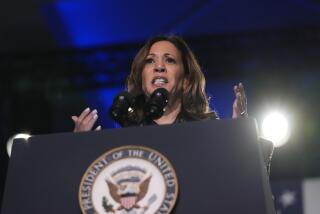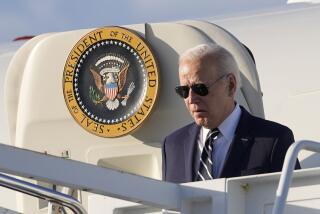Biden in Iraq to discuss election crisis
- Share via
Reporting from Baghdad — Vice President Joe Biden flew into Baghdad on Friday night with a mission to ease rising tensions over the barring of hundreds of mostly secular candidates from Iraq’s upcoming elections.
U.S. officials said Biden’s visit, his third to the country as vice president, had been planned weeks in advance as a routine engagement with Iraqi leaders as the U.S. prepares to draw down troops this year. But the controversial decision by an Iraqi government commission to ban at least 511 candidates from the March balloting because of suspected ties to the outlawed Baath Party of the former regime has added a sense of urgency to Biden’s meetings today with Iraqi leaders.
Biden’s national security advisor Antony Blinken said the vice president would offer no specific proposals to resolve the controversy, but would emphasize the Obama administration’s concern that the electoral process should be transparent and inclusive.
The disqualification of candidates, who belong mostly to secular and Sunni Arab-dominated parties, has given rise to concerns that members of Iraq’s Sunni Muslim minority will feel disenfranchised and refuse to recognize the legitimacy of the next government. The current government, dominated by Shiite Muslim religious parties, has rushed to lend its support to the ban, but U.S. officials say they have detected signs that some leaders are starting to have second thoughts about the potentially divisive move.
“They’re extremely focused on the problem and seem to be focused on resolving it,” Blinken said.
A day earlier, Iraqi President Jalal Talabani questioned the legality of the Accountability and Justice Commission, which ordered the bans, becoming the first senior Iraqi official to challenge the decision. Talabani’s office announced Friday that the presidency council, the prime minister, the speaker of parliament and the head of the Supreme Court would hold a meeting today to review the disqualifications.
Several of the barred candidates have urged the United States to exert pressure on the Iraqi government to reverse the bans, but Iraqi officials have made it clear that they do not want Washington to dictate a solution. Talabani, an ethnic Kurd, told reporters that Iraq would not “take orders” from any country, and government spokesman Ali Dabbagh issued a statement Friday saying that the issue was “an internal affair that should be resolved by Iraqi political forces.”
Blinken said Biden would be careful to avoid the impression that Washington was trying to impose its will. “I don’t think it’s the place of the U.S. or any other outside country to resolve these problems for Iraqis,” Blinken said.
Times staff writer Raheem Salman contributed to this report.
More to Read
Sign up for Essential California
The most important California stories and recommendations in your inbox every morning.
You may occasionally receive promotional content from the Los Angeles Times.













